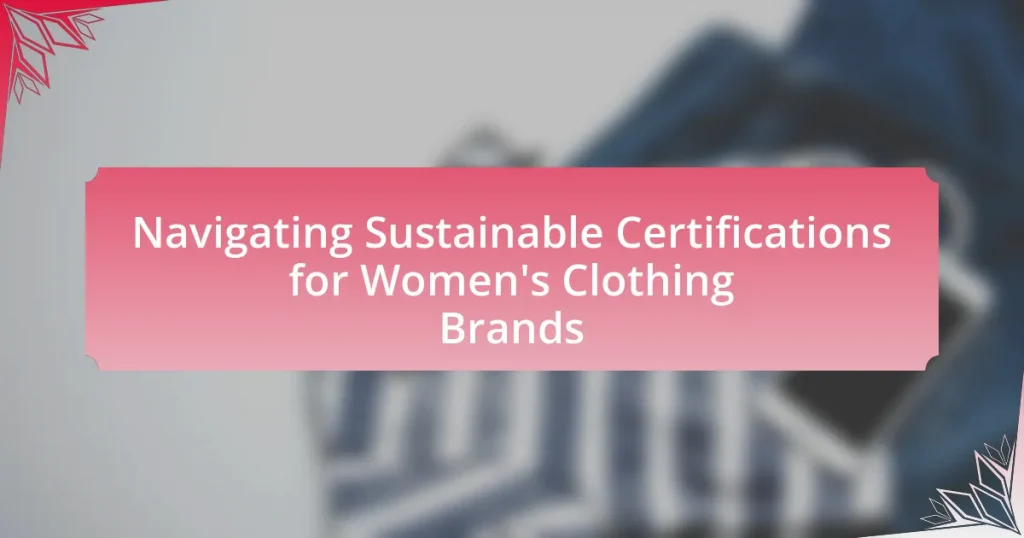The article focuses on sustainable certifications for women’s clothing brands, highlighting key certifications such as GOTS (Global Organic Textile Standard), OEKO-TEX, and Fair Trade. It explains the importance of these certifications in promoting ethical practices and environmental responsibility, as well as their impact on consumer choices and brand reputation. The article outlines the various types of certifications, the certification process, and the benefits they provide, including enhanced credibility and market share. Additionally, it addresses common challenges brands face during certification and offers best practices for effectively navigating the certification landscape.
What are Sustainable Certifications for Women’s Clothing Brands?
Sustainable certifications for women’s clothing brands include GOTS (Global Organic Textile Standard), OEKO-TEX, and Fair Trade. GOTS certifies organic fibers and ensures environmentally and socially responsible manufacturing processes. OEKO-TEX focuses on testing textiles for harmful substances, ensuring safety for consumers. Fair Trade certification guarantees fair wages and working conditions for workers in the supply chain. These certifications provide consumers with assurance regarding the sustainability and ethical practices of clothing brands, promoting transparency and accountability in the fashion industry.
Why are Sustainable Certifications Important for Women’s Clothing Brands?
Sustainable certifications are important for women’s clothing brands because they provide verified assurance of environmentally friendly and ethical practices. These certifications, such as GOTS (Global Organic Textile Standard) and OEKO-TEX, help brands demonstrate their commitment to sustainability, which is increasingly demanded by consumers. According to a 2021 McKinsey report, 67% of consumers consider sustainability when making a purchase, highlighting the market advantage for certified brands. Additionally, certifications can enhance brand reputation, attract eco-conscious customers, and potentially lead to increased sales, as consumers are willing to pay more for sustainable products.
How do Sustainable Certifications impact consumer choices?
Sustainable certifications significantly influence consumer choices by enhancing trust and credibility in products. Research indicates that 66% of global consumers are willing to pay more for sustainable brands, demonstrating a clear preference for certified products. Certifications such as Fair Trade, GOTS, and OEKO-TEX provide consumers with assurance regarding ethical practices and environmental impact, leading to increased purchasing decisions in favor of certified brands. Furthermore, a study by Nielsen found that 73% of millennials are willing to pay extra for sustainable offerings, highlighting the growing importance of sustainability in consumer behavior.
What role do Sustainable Certifications play in brand reputation?
Sustainable certifications significantly enhance brand reputation by signaling a commitment to environmental and social responsibility. Brands that obtain recognized certifications, such as GOTS (Global Organic Textile Standard) or Fair Trade, demonstrate adherence to rigorous sustainability standards, which can attract environmentally conscious consumers. Research indicates that 66% of global consumers are willing to pay more for sustainable brands, highlighting the positive impact of certifications on consumer perception and loyalty. Furthermore, brands with sustainable certifications often experience increased trust and credibility, as these certifications serve as third-party validation of their claims, ultimately leading to a stronger market position and competitive advantage.
What Types of Sustainable Certifications Exist for Women’s Clothing Brands?
Various sustainable certifications exist for women’s clothing brands, including Global Organic Textile Standard (GOTS), OEKO-TEX Standard 100, Fair Trade Certified, and the Responsible Wool Standard (RWS). GOTS certifies organic fibers and ensures environmentally and socially responsible manufacturing processes. OEKO-TEX Standard 100 tests textiles for harmful substances, promoting safety for consumers. Fair Trade Certified focuses on fair labor practices and equitable trade, ensuring that workers receive fair wages and safe working conditions. The Responsible Wool Standard ensures that wool comes from farms with sustainable practices and animal welfare standards. These certifications provide consumers with assurance regarding the sustainability and ethical practices of clothing brands.
What are the most recognized certifications in the industry?
The most recognized certifications in the sustainable clothing industry include Global Organic Textile Standard (GOTS), OEKO-TEX Standard 100, and Fair Trade Certified. GOTS is widely acknowledged for its rigorous standards in organic textiles, ensuring that products are made from at least 70% organic fibers and adhere to environmental and social criteria. OEKO-TEX Standard 100 certifies textiles free from harmful substances, promoting safety for consumers. Fair Trade Certified focuses on equitable trade practices, ensuring fair wages and safe working conditions for workers. These certifications are essential for brands aiming to demonstrate their commitment to sustainability and ethical practices in women’s clothing.
How do these certifications differ from one another?
Sustainable certifications for women’s clothing brands differ primarily in their focus areas, criteria, and the standards they enforce. For instance, GOTS (Global Organic Textile Standard) emphasizes organic fiber content and environmentally friendly manufacturing processes, while OEKO-TEX certification focuses on the absence of harmful substances in textiles. Additionally, Fair Trade certification prioritizes social and economic fairness for workers, ensuring equitable wages and safe working conditions. Each certification serves distinct purposes, catering to various aspects of sustainability, such as environmental impact, social responsibility, or chemical safety, thereby guiding brands in aligning their practices with specific sustainability goals.
How can Women’s Clothing Brands Navigate the Certification Process?
Women’s clothing brands can navigate the certification process by thoroughly understanding the specific requirements of each certification they aim to achieve. This involves researching the standards set by organizations such as Global Organic Textile Standard (GOTS) or OEKO-TEX, which outline criteria for sustainability and ethical practices in textile production. Brands should also establish a clear plan for compliance, which includes sourcing materials from certified suppliers, implementing sustainable manufacturing practices, and maintaining transparent supply chains.
Additionally, engaging with certification bodies early in the process can provide valuable guidance and clarify any uncertainties regarding documentation and procedures. For instance, GOTS offers resources and support for brands seeking certification, which can streamline the process. By following these steps, women’s clothing brands can effectively navigate the certification landscape, ensuring they meet the necessary standards for sustainability and ethical production.
What steps should brands take to obtain certifications?
Brands should follow a structured process to obtain certifications by first identifying the relevant certification standards applicable to their products. This involves researching certifications such as GOTS (Global Organic Textile Standard) or OEKO-TEX, which are crucial for sustainable clothing. Next, brands must ensure compliance with the specific requirements of the chosen certification, which may include sourcing materials from certified suppliers, implementing sustainable manufacturing practices, and maintaining transparent supply chains.
After meeting these criteria, brands should gather necessary documentation and evidence of compliance, such as audits and product testing results. Finally, they must submit an application to the certifying body, which will review the documentation and conduct any required inspections or audits before granting certification. This process is validated by the fact that certifications like GOTS require rigorous adherence to environmental and social criteria, ensuring that brands are genuinely committed to sustainability.
What challenges might brands face during the certification process?
Brands may face several challenges during the certification process, including complex requirements, high costs, and lengthy timelines. The complexity arises from the need to meet specific standards set by certifying bodies, which can vary significantly across different certifications. High costs can include fees for application, audits, and necessary changes to production processes to comply with certification standards. Additionally, the certification process can be time-consuming, often taking several months to complete, which can delay product launches and affect market competitiveness. These challenges can hinder a brand’s ability to achieve and maintain sustainable certification, impacting their overall sustainability goals.
What are the Benefits of Sustainable Certifications for Women’s Clothing Brands?
Sustainable certifications provide women’s clothing brands with enhanced credibility, access to eco-conscious consumers, and potential cost savings through efficient resource management. These certifications, such as GOTS (Global Organic Textile Standard) and OEKO-TEX, validate a brand’s commitment to environmental and social responsibility, which can attract a growing market segment that prioritizes sustainability. Research indicates that 66% of consumers are willing to pay more for sustainable brands, demonstrating the financial incentive for brands to pursue these certifications. Additionally, brands that implement sustainable practices often experience reduced waste and lower energy costs, further improving their bottom line.
How do Sustainable Certifications enhance brand loyalty?
Sustainable certifications enhance brand loyalty by signaling to consumers that a brand is committed to ethical practices and environmental responsibility. This commitment fosters trust and emotional connection, as consumers increasingly prefer brands that align with their values. Research indicates that 66% of global consumers are willing to pay more for sustainable brands, demonstrating a direct correlation between sustainability certifications and consumer purchasing behavior. Furthermore, brands with recognized certifications often experience higher customer retention rates, as consumers feel more confident in their choices, knowing they support responsible practices.
What evidence supports the link between certifications and customer trust?
Certifications significantly enhance customer trust, as evidenced by various studies indicating that consumers are more likely to purchase from brands with recognized certifications. For instance, a survey by Nielsen found that 66% of global consumers are willing to pay more for sustainable brands, highlighting the importance of certifications in influencing purchasing decisions. Additionally, research published in the Journal of Business Research demonstrates that certifications serve as signals of quality and ethical practices, leading to increased consumer confidence. These findings collectively support the assertion that certifications are a crucial factor in building customer trust in the context of sustainable clothing brands.
How can certifications lead to increased sales and market share?
Certifications can lead to increased sales and market share by enhancing brand credibility and consumer trust. When a women’s clothing brand obtains recognized certifications, such as Fair Trade or Global Organic Textile Standard, it signals to consumers that the brand adheres to high ethical and environmental standards. This trust can translate into higher sales, as studies show that 66% of consumers are willing to pay more for sustainable brands. Furthermore, certifications can differentiate a brand in a competitive market, attracting a growing segment of eco-conscious consumers, thereby expanding market share. For instance, brands with sustainability certifications often report a 20% increase in customer loyalty, which directly correlates with repeat purchases and overall sales growth.
What Environmental and Social Impacts do Certifications Address?
Certifications address various environmental and social impacts, including resource conservation, waste reduction, fair labor practices, and community well-being. Specifically, environmental certifications often focus on minimizing carbon footprints, promoting sustainable sourcing of materials, and ensuring responsible water usage. For instance, certifications like Global Organic Textile Standard (GOTS) require organic farming practices that reduce pesticide use and enhance soil health. On the social side, certifications such as Fair Trade ensure that workers receive fair wages and work in safe conditions, directly impacting their quality of life. These certifications collectively aim to foster a more sustainable and equitable fashion industry.
How do certifications contribute to reducing environmental footprints?
Certifications contribute to reducing environmental footprints by establishing standards that promote sustainable practices in production and supply chains. These certifications, such as Global Organic Textile Standard (GOTS) and OEKO-TEX, require adherence to environmentally friendly processes, including reduced chemical usage, responsible water management, and waste reduction. For instance, GOTS-certified textiles must contain at least 70% organic fibers and follow strict environmental and social criteria throughout the supply chain, which directly minimizes pollution and resource depletion. Additionally, certified brands often implement lifecycle assessments to measure and improve their environmental impact, leading to more sustainable practices overall.
What social issues are addressed through sustainable certifications?
Sustainable certifications address several social issues, including labor rights, fair wages, and gender equality. These certifications often require compliance with ethical labor practices, ensuring that workers are treated fairly and compensated adequately. For instance, certifications like Fair Trade mandate that producers adhere to specific labor standards, which include prohibiting child labor and ensuring safe working conditions. Additionally, many sustainable certifications promote gender equality by supporting women’s empowerment initiatives within supply chains, thereby addressing disparities in employment opportunities and wages for women in the garment industry.
What Best Practices Should Women’s Clothing Brands Follow for Sustainable Certifications?
Women’s clothing brands should prioritize transparency, ethical sourcing, and adherence to recognized standards when pursuing sustainable certifications. Transparency involves openly sharing information about supply chains, production processes, and material sourcing, which builds consumer trust and accountability. Ethical sourcing requires brands to select materials and partners that prioritize environmental sustainability and fair labor practices, ensuring that their products are not only eco-friendly but also socially responsible. Adhering to recognized standards, such as Global Organic Textile Standard (GOTS) or OEKO-TEX, provides a framework for brands to meet specific sustainability criteria, which can enhance credibility and marketability. These practices are supported by research indicating that consumers increasingly prefer brands that demonstrate a commitment to sustainability, with 66% of global consumers willing to pay more for sustainable brands, according to a Nielsen report.
How can brands effectively communicate their certifications to consumers?
Brands can effectively communicate their certifications to consumers by prominently displaying certification logos on product packaging and marketing materials. This visibility helps consumers easily recognize and trust the certifications, enhancing brand credibility. Research indicates that 66% of consumers are willing to pay more for sustainable brands, highlighting the importance of clear communication regarding certifications. Additionally, brands can utilize digital platforms, such as websites and social media, to provide detailed information about the certifications, including the standards met and the benefits of those certifications. This approach not only informs consumers but also engages them, fostering a deeper connection with the brand.
What marketing strategies work best for promoting sustainability certifications?
Effective marketing strategies for promoting sustainability certifications include leveraging social media campaigns, collaborating with influencers, and utilizing educational content. Social media platforms allow brands to reach a broad audience, showcasing their sustainability efforts and certifications through engaging visuals and storytelling. Collaborating with influencers who align with sustainability values can enhance credibility and reach, as these individuals often have dedicated followings that trust their recommendations. Additionally, creating educational content, such as blog posts or videos that explain the significance of sustainability certifications, helps inform consumers and builds brand authority. Research indicates that 66% of consumers are willing to pay more for sustainable brands, highlighting the importance of effectively communicating these certifications to attract eco-conscious shoppers.
How can brands educate consumers about the importance of these certifications?
Brands can educate consumers about the importance of sustainable certifications by providing clear, accessible information through multiple channels. For instance, brands can utilize their websites and social media platforms to explain the significance of certifications like GOTS or Fair Trade, detailing how these standards ensure ethical practices and environmental sustainability. Research indicates that 66% of consumers are willing to pay more for sustainable brands, highlighting the demand for transparency in the certification process. By sharing stories of their supply chain, showcasing certified products, and offering educational content, brands can effectively raise awareness and foster trust among consumers regarding the value of these certifications.
What Common Mistakes Should Brands Avoid in the Certification Process?
Brands should avoid several common mistakes in the certification process, including inadequate research on certification requirements, failing to engage stakeholders, and neglecting to maintain documentation. Inadequate research can lead to selecting inappropriate certifications that do not align with brand values or consumer expectations. Engaging stakeholders, such as suppliers and employees, is crucial for ensuring that the certification process is comprehensive and reflects the entire supply chain. Additionally, maintaining thorough documentation is essential for demonstrating compliance and facilitating audits, as many brands lose certification due to insufficient records. These mistakes can hinder a brand’s credibility and effectiveness in achieving sustainable certification.
What pitfalls can lead to certification failures?
Certification failures can occur due to inadequate documentation and lack of compliance with standards. Many brands fail to provide the necessary evidence of sustainable practices, which is crucial for certification bodies to validate claims. For instance, a study by the International Organization for Standardization indicates that 30% of certification failures stem from insufficient records demonstrating adherence to environmental and social criteria. Additionally, miscommunication between stakeholders regarding certification requirements can lead to misunderstandings, further increasing the risk of failure.
How can brands ensure they maintain compliance with certification standards?
Brands can ensure they maintain compliance with certification standards by implementing a robust compliance management system that includes regular audits, employee training, and documentation of processes. This system should be aligned with the specific requirements of the certifications they pursue, such as GOTS or OEKO-TEX, which mandate adherence to environmental and social criteria. Regular audits help identify gaps in compliance, while training ensures that all employees understand the standards and their roles in maintaining them. Documentation serves as a record of compliance efforts and can be crucial during certification renewal processes.
What Resources are Available for Women’s Clothing Brands Seeking Certifications?
Women’s clothing brands seeking certifications can access various resources, including certification bodies, industry associations, and online platforms. Certification bodies such as GOTS (Global Organic Textile Standard) and OEKO-TEX provide guidelines and standards for sustainable practices. Industry associations like the Sustainable Apparel Coalition offer tools and resources for brands to measure and improve their sustainability efforts. Additionally, online platforms such as the Textile Exchange provide educational materials and certification programs that help brands navigate the certification process effectively. These resources are essential for brands aiming to enhance their sustainability credentials and meet consumer demand for ethically produced clothing.
Where can brands find guidance on sustainable practices and certifications?
Brands can find guidance on sustainable practices and certifications through various organizations and resources dedicated to sustainability in the fashion industry. Notable sources include the Global Organic Textile Standard (GOTS), which provides comprehensive guidelines for organic textiles, and the Sustainable Apparel Coalition (SAC), which offers tools like the Higg Index to assess environmental and social sustainability. Additionally, the Fashion Revolution organization promotes transparency and ethical practices, providing resources for brands to improve their sustainability efforts. These organizations are recognized for their expertise and have established frameworks that help brands navigate the complexities of sustainable certifications effectively.
What organizations offer support for navigating the certification process?
Organizations that offer support for navigating the certification process include the Global Organic Textile Standard (GOTS), the Sustainable Apparel Coalition (SAC), and the Fair Trade Federation (FTF). GOTS provides guidelines for organic textiles and offers certification services, ensuring compliance with environmental and social criteria. The SAC focuses on sustainability in the apparel industry, providing tools like the Higg Index to help brands assess their sustainability performance. The FTF supports fair trade practices and offers resources for brands seeking Fair Trade certification, promoting ethical production standards. These organizations play a crucial role in guiding women’s clothing brands through the complexities of sustainable certification.














